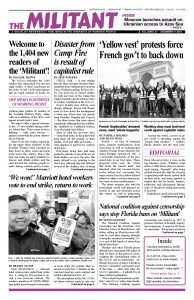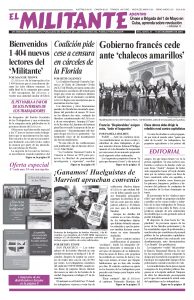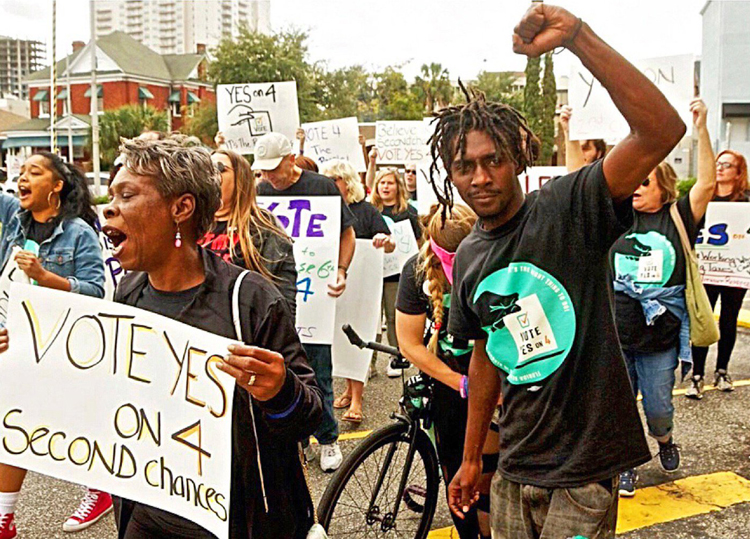Working people across the country were inspired by the Nov. 6 voting rights victory in Florida when an amendment to the state constitution was passed overwhelmingly, restoring the franchise to workers released from prison after serving time on felony convictions.
Supporters of workers’ rights are organizing to press for similar advances across the country.
Outside of Florida, laws that restrict the franchise for ex-felons prohibit some 5 million people from voting. This represents an enormous increase from 1976, when it was 1.17 million — due to the soaring number of workers thrown behind bars as the capitalist rulers cranked up their criminal “justice” system. This includes one in 13 African-American men nationwide.
Kentucky’s constitution permanently bans all workers with past felony convictions — some 300,000 — from voting, unless the governor personally restores their franchise. In 2017 Gov. Matt Bevin reinstated voting rights to only 24 ex-prisoners out of the 1,100 who applied.
After the Florida vote, Kentucky State Sen. Morgan McGarvey said he would propose a constitutional amendment allowing some who have completed their felony sentences to vote. Such amendments must be passed by the state legislature and approved by 60 percent of voters in a referendum.
In 1792 Kentucky’s constitution was the first in the country to disenfranchise people convicted of a crime. The anti-working-class restriction disproportionately affects African-Americans, barring one in five from voting there today.
In Iowa, workers convicted of a felony are ineligible to vote unless given permission by either the governor or the president. You have to pay all fines or costs imposed on you by the courts before you can file a petition requesting the right to vote. This has disenfranchised some 52,000 people, roughly 2 percent of the state’s population.
“We really want Iowa to continue to move forward and get out of that one or two states” that don’t allow felons who have completed their sentences to vote, Karen Person, speaking for the League of Women Voters of Iowa, told a hearing of Iowa’s Public Safety Advisory Board Nov. 14. The board unanimously recommended the state restore these rights.
On Nov. 29 Gov. Kim Reynolds told the press she was open to the possibility of restoring voting rights to felons in Iowa.
State Reps. in New Jersey introduced a bill Feb. 26 to allow some 94,000 workers with convictions, including 58,000 on probation and 15,000 on parole, to vote. If the bill passes, New Jersey will become the third state, along with Maine and Vermont, to allow voting for workers in prison, on probation and parole
The measure is backed by more than 75 organizations, including the NAACP and the American Civil Liberties Union.
Some anti-working-class restrictions remain under the new Florida law. Workers convicted of felonies can’t regain their voting rights until they finish all parole or probation. And those found guilty of murder or sex crimes are excluded. The momentum from the referendum victory opens the door to moves like those being advanced in New Jersey.
In other states with laws on the books like the one voted down in Florida, the governor is granted the authority to restore ex-felons’ voting rights. Before leaving office in January 2018, Virginia Gov. Terry McAuliffe individually reinstated voting for some 173,000 workers who had completed their sentences, parole and probation.
In April, New York Gov. Andrew Cuomo issued an executive order restoring voting rights to ex-prisoners granted conditional pardons after being released on parole. Some 32,000 conditional pardons have been issued so far this year.
The fact that Cuomo and other governors are taking this action reflects the impact of the growing working-class sentiment on this issue. In the first five years of Cuomo’s administration he had only issued eight such pardons.
To ensure ex-prisoners’ right to vote requires abolishing these laws, not reliance on capitalist politicians.
Even where it is legal for ex-prisoners to vote, local authorities’ disdain for working people can create obstacles. The New York City Voters Guide mailed out two weeks before the 2018 election wrongly stated that you cannot vote if you are “on parole for a felony.” Election officials later apologized.


